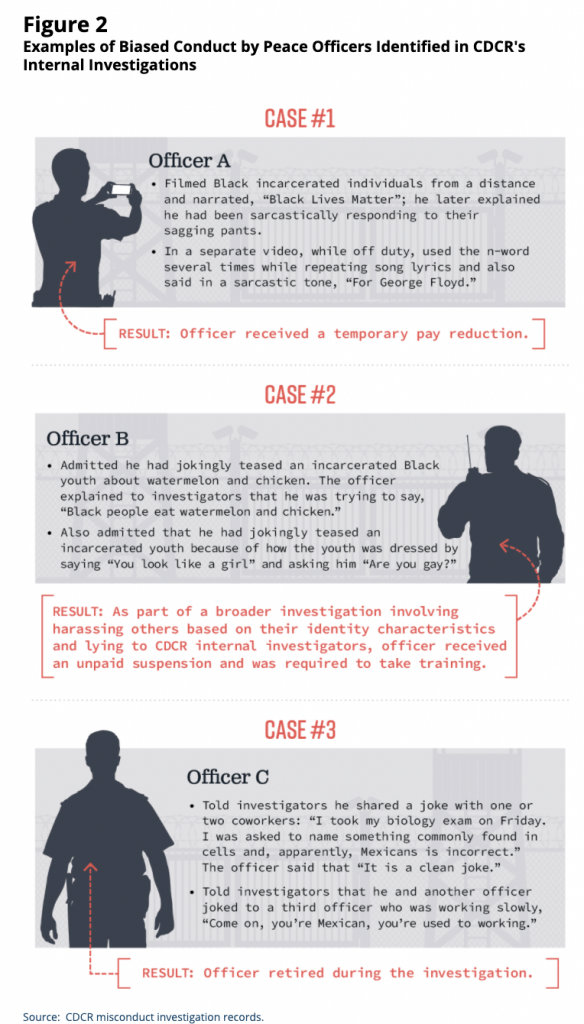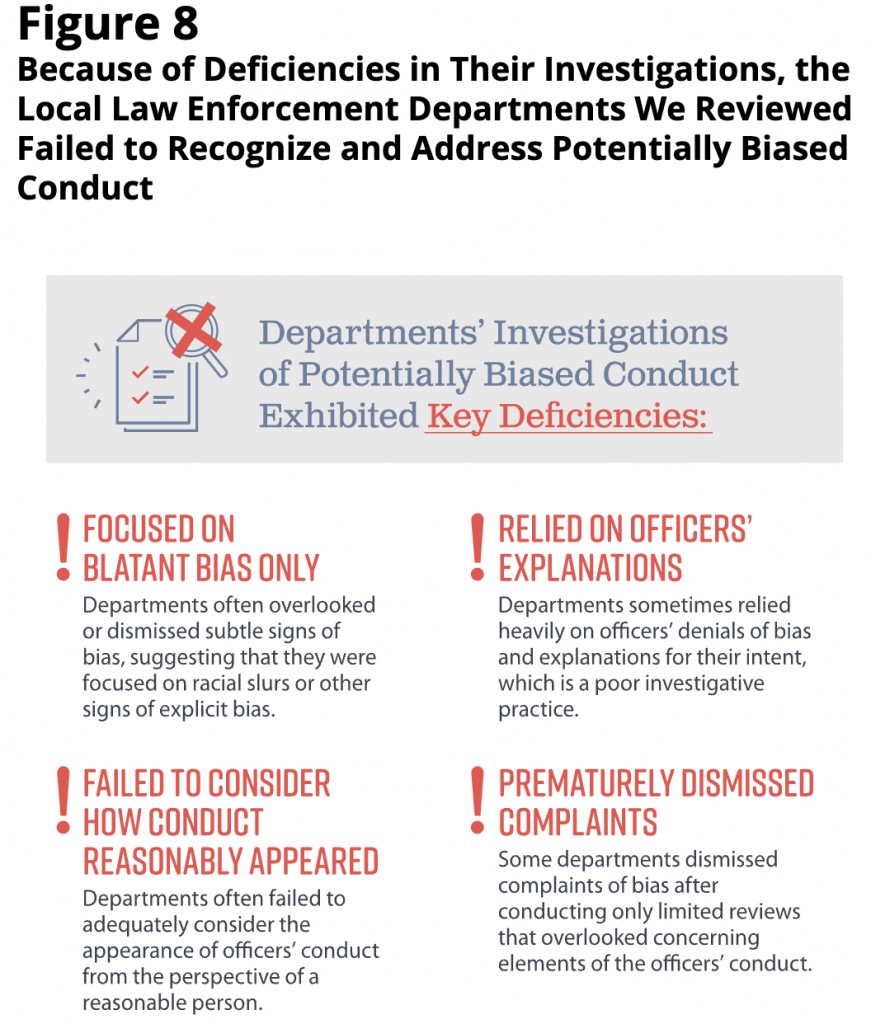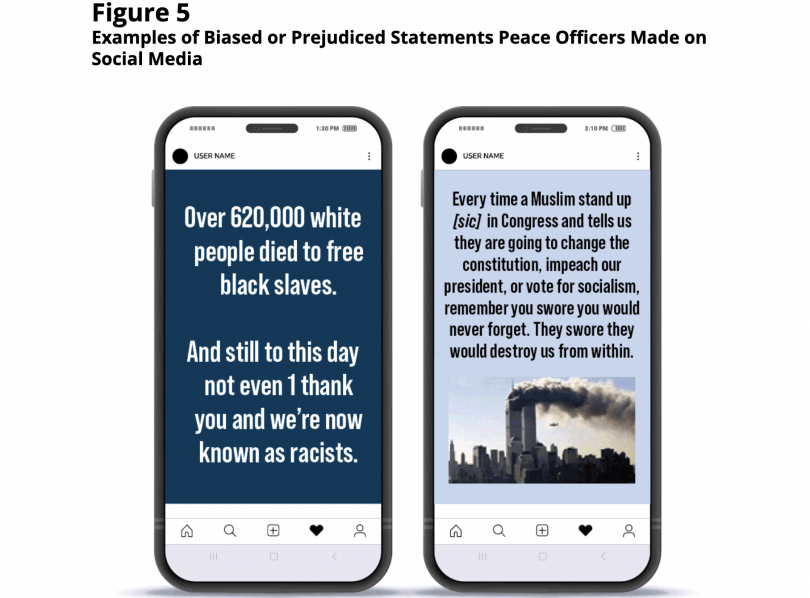A new state-level audit of five police agencies in California, including the Los Angeles County Sheriff’s Department (LASD), found biased conduct among law enforcement officers and little accountability for such behavior.
The other four agencies were the San Bernardino, San Jose, and Stockton Police Departments, and the California Department of Corrections and Rehabilitation (CDCR), which run’s the state’s prison system.
The auditor’s team looked at the online posts of approximately 450 officers across the agencies, and 25 investigations departments had undertaken in response to complaints from the public or colleagues about biased behavior or remarks.
The report highlights three cases in which incidents lead to internal investigations by the CDCR. One case involved a guard who filmed black incarcerated people while commenting “Black Lives Matter,” and who later explained that he said the phrase sarcastically. Video footage also showed this officer using the N-word off-duty, and saying, “For George Floyd,” sarcastically. Department leadership temporarily docked this officer’s pay.
In another case, an officer received an unpaid suspension and was made to take training after teasing an incarcerated young Black person about watermelon and chicken, and teasing another youth about dressing in a manner the officer deemed feminine and “gay.”
Another member of the CDCR retired during an investigation in which he admitted to making comments about Mexicans commonly being found behind bars, and about how a colleague perceived to be working slowly should, as a Mexican, be “used to working.”

Although the audit did not find that any officer was a member of a hate group, the team did note instances in which 17 different officers had made biased statements or else promoted biased content on social media platforms. Three of those officers were members of the LASD.
One officer posted that people standing against the (anti-Muslim, anti-woman) Proud Boys group were “in reality just against masculinity.” This officer also shared statements that were demeaning to transgender people and stereotyped Asians. Five other officers expressed support for problematic groups.
“The biased conduct we identified was generated by a small number of the officers at each department,” the audit stated. “Nevertheless, concluding on that basis alone that bias is not a significant problem at these departments would be incorrect for a number of reasons.” Not to mention, seeing blatant bias from even a small percentage of officers still erodes public trust in the whole department.
The audit team also pointed out that they might have been able to look at more biased conduct from the LASD if the department had implemented body-worn cameras like the other law enforcement agencies. “Expanding the use of body-worn cameras in custody settings,” the auditors added, “would improve Los Angeles Sheriff’s ability to effectively investigate allegations of officer misconduct.”
In one case, the state auditor was able to examine an incident only because the law enforcement officer involved recorded the events on his cell phone.
The agencies reviewed should also have stronger safeguards against and responses to biased behavior from officers, according to the report.
Neither the Stockton PD nor the CDCR even have policies prohibiting biased conduct among officers. These agencies, the audit said, should take action by “declaring that biased conduct is prohibited, describing in detail what constitutes biased conduct, and outlining key compliance mechanisms.”
Yet, while the other agencies have concrete anti-bias policies, words on paper are not enough to prevent bias.
Borrowing from best policing practices established by the U.S. Department of Justice, the Commission on Peace Officer Standards and Training (POST), and others, the audit issued a series of recommendations for combating bias among law enforcement. The recommendations include hiring a workforce that mirrors the diversity of the community, screening applicants for bias, improving bias training and promoting cultural awareness, involving the community in shaping strategies for combating bias, and better monitoring, investigation, and discipline for biased acts.

“Departments’ internal investigations often considered only the most blatant forms of bias,” according to the report. “In one such case, a member of the public filed a complaint about an officer’s social media posts. Although the officer’s posts endorsed potentially harmful stereotypes about Black parents and Syrian refugees, the department’s investigation concluded that it was ‘unable to find any racially derogatory remarks’ and that the allegation of prejudice was ‘clearly false.’”
Departments also too readily accepted officers’ denials that they engaged in bias, which the audit notes is a “poor investigative tactic.”
The LASD, San Bernardino Police, and Stockton Police also prematurely dismissed at least one complaint each about bias without addressing the behavior challenged in the complaint. In one example, an officer accused a Black man of playing “the race card,” then said he wished “we lived in a world, back in the 60s and 70s, where we could feel comfortable.” This statement, the audit notes, “overlooks the negative experiences of many Black Americans during that era.”
When the Black man said that a neighbor might have used a racial slur directed at him, the officer began listing other slurs aloud to demonstrate that using those slurs was protected as free speech.
The supervisor who investigated the resident’s complaint against the officer wrote that the officer “did an excellent job,” but could have used “a different remark other than ‘race card,'” because the complainant “could only focus on [that] remark.”
When the auditor’s team brought this investigation to the attention of a department sergeant whose unit investigates complaints, the sergeant agreed that the review could have been more thorough, but blamed a lack of guidelines about what constitutes biased conduct.
The four local departments, the audit said, clearly “lack a sufficient framework for investigating such issues.” San Jose PD was the only agency that referenced a bias-focused policy in its misconduct investigations.
While the LASD and San Bernardino PD have bias policies, their investigations into possible bias did not analyze whether conduct met the agency’s definition of bias.
As part of its response to the audit’s recommendations, the LASD said that establishing investigative and disciplinary processes to root out bias would be “difficult at best.”
The state auditor disagreed. “Los Angeles Sheriff already has a bias-free policing policy, which we discuss here and here,” said the response. “Therefore, it is already incumbent on Los Angeles Sheriff to have a thorough and consistent method for assessing whether its officers have violated this policy.”


That’s why LASD (I.C.I.B, I.A) should never rely on “CROOKed” OSS detective’s personal cellular video recording to make their bullshit case (charges) stick.
California is an all-party consent state. It is illegal to record a confidential conversation, including private conversations or telephone calls, without consent in California. A violation of this rule is the crime of eavesdropping, per Penal Code 632 PC
☝ Perhaps why justifying Crook’s arrival with a paper log? No official business arriving on scene?
Ms. Walker,
Interesting how you point out “biases & prejudices” that LEO’s have made on their social media platforms. Based on the examples you presented, as well as the pictured statements on the face of cellular telephones (Fig. 5), are these statements really biased & prejudiced? Or are they actual true statements being taken out of context, to imply biases?
Further, during the investigations of these LEO’s, none of the LEO’s were members of any hate group. However, according to the investigator’s report (IAB etc.), the statements which were made were not racially charged, “playing the race card..” However, due to the sensitivity factor, a different term could have been utilized. How does advocating racial, stereotypical behavior sound?
What I do find interesting, is how the media, as well as paid racial provocateurs (i.e., Jackson, Sharpton), are quick to cry foul when statements, ideology and beliefs are made, which do not coincide with others (Progressives) narrative.
It is incredible how the party who claims to be the party fighting for inclusion, freedom, choice, democracy etc., are the same people who are desperately trying to stifle others for their beliefs. If you think I am wrong, let us use Mr. Elon Musk as an example, of when he purchased Twitter. The Left was utilizing Twitter and other social media platforms to stifle conservative viewpoints. However, since Mr. Musk purchased Twitter, the Left is projecting their actions onto Mr. Musk. Heck, there was a totally unhinged host of the View, who stated that Mr. Musk’s purchase of Twitter was typical of a white male.
Sine the Resident of the WH recently established his “Ministry of Truth,” it is obvious that the media and Progressives are going to do everything in their power to silence those who do not “tow the line.” This, is incredibly scary and is reminiscent of The Reich Ministry for Public Enlightenment and Propaganda in Nazi Germany. This group was responsible for controlling the content of the press, literature, visual arts, film, theater, music and radio in Nazi Germany. Hmm, this sounds very familiar.
However, God is on our side and you people WILL NOT be successful in your endeavors. Further, because of your anti-America agenda, many people have had their eyes opened and are no longer being led astray.
The AWFL’s (affluent white female liberals) view the justice system like an over controlling parent views their kids. The good kid gets hammered, while it’s never the bad kids fault. Because they have control of the cops, the cops get micromanaged right down to thought crimes. Because the have no control over criminals, crime is ignored or dismissed as someone else’s fault.